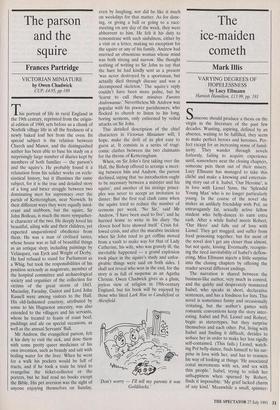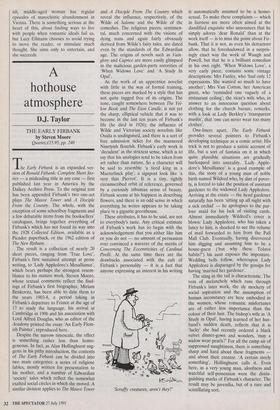The ice-maiden cometh
Mark Illis
VARYING DEGREES OF HOPELESSNESS by Lucy Ellmann Hamish Hamilton, £13.99, pp. 181
omeone should produce a thesis on the virgin in the literature of the past few decades. Wanting, aspiring, defined by an absence, waiting to be fulfilled, they seem to make perfect heroes and heroines. Per- fect except for an increasing sense of famil- iarity. They wander through novels forlornly, failing to acquire experience until, somewhere near the closing chapters, someone puts them out of their misery. Lucy Ellmann has managed to take this cliché and make a knowing and entertain- ing story out of it. Isabel, 'Our Heroine', is in love with Lionel Syms, the 'Splendid Young Man' who is no longer particularly young. In the course of the novel she makes an unlikely friendship with Pol, an extravagantly fat, sexually active fellow student who belly-dances to earn extra cash. After a while Isabel meets Robert, `Our Hero' and falls out of love with Lionel. They get mugged, and suffer from food poisoning together, but for most of the novel don't get any closer than almost, but not quite, kissing. Eventually, recognis- ing the tired inevitability of Isabel's deflow- ering, Miss Ellmann injects a little surprise into the closing chapters by offering the reader several different endings.
The narration is shared between the business-like author, very much in control, and the quirky and desperately mannered Isabel, who speaks in short, declarative sentences, and has a fondness for lists. This novel is sometimes funny and occasionally irritating, but the author's games with romantic conventions keep the story inter- esting. Isabel and Pol, Lionel and Robert, begin as stereotypes, but they surprise themselves and each other. Pol, living with Isabel and finding it difficult, decides to seduce her in order to make her less rigidly self-contained. (This fails.) Lionel, watch- ing Pol belly-dance, finds himself to his sur- prise in love with her, and has to reassess his way of looking at things: 'He associated coital movements with sex, and sex with thin people.' Isabel, trying to relish her unhappiness when spurned by Robert, finds it impossible: 'My grief lacked charm of any kind.' Meanwhile a small, spinster- ish, middle-aged woman has regular episodes of masochistic abandonment in Vienna. There is something serious at the heart of this, about finding ways to live with people when romantic ideals fail us, but Lucy Ellmann chooses to avoid trying to move the reader, or stimulate much thought. She aims only to entertain, and she succeeds.



















































 Previous page
Previous page